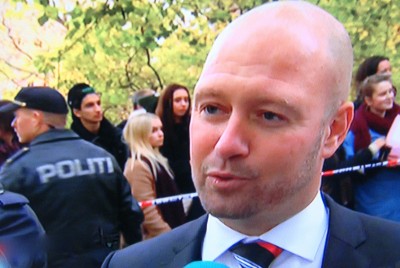Justice Minister Anders Anundsen is under pressure to make swift reforms in asylum policies and practices in Norway, after an asylum seeker fatally stabbed three persons on board a bus on Monday. The man from South Sudan met with his defense attorney on Wednesday, but had not undergone any police questioning as of Wednesday afternoon.

Fredrik Verling, appointed as defense attorney for the 31-year-old refugee who became a triple murderer on Monday, visited his client at the Sandviken psychiatric hospital in Bergen. He told reporters afterwards that the man who’d been staying at an asylum center in the mountain community of Årdal was “very affected” by what happened on board the bus but otherwise “polite, friendly and calm.”
The conversation was meant to determine whether the defendant is capable of undergoing police questioning. Verling wouldn’t immediately say, telling state broadcaster NRK that he needed to take that up first with the investigators from special state crime unit Kripos. His client faces a custody hearing on Thursday.
Evaluating mental health
A court-appointed psychiatrist has also been called in to evaluate the defendant’s mental state, an issue critical to his case and to the asylum policies now subject to reform. Norway currently carries out no routine psychiatric examinations of arriving refugees, even when they come from war zones and are known to have suffered severe trauma.
A total of 9,259 asylum seekers have arrived in Norway during the first nine months of this year, reported newspaper Aftenposten, up 32 percent from the same period last year. All are required to undergo testing for tuberculosis and HIV/AIDS, but examinations that could reveal mental illness are not a priority, officials have confirmed.
Now that’s up for debate, along with how many refugees Norway has the capacity to accept, how they should be housed, and what happens to them if their applications for asylum are rejected. Anundsen has said there currently are around 5,000 rejected refugees in Norway, all of whom are subject to deportation because they technically are in the country illegally.
Calls for faster deportations
The man who went on the attack Monday is among them, and was due to have been deported himself on Tuesday, seven months after arriving in Norway. Justice Minister Anundsen’s fellow members of the conservative Progress Party are demanding faster deportations and they also want rejected refugees to be housed in locked institutions until they’re sent out of the country. They fear more may become desperate, as the bus attacker was described, and resort to violence.
“Now we must carry out some major reforms immediately,” Per Sandberg, a Member of Parliament for the Progress Party who formerly headed the justice committee, told Nettavisen. Sandberg is among those calling for more comprehensive health evaluations, establishment of locked asylum centers, quicker deportation and better police response. The police are also responsible for carrying out deportations in Norway.
Anundsen, who headed the parliamentary committee that investigated the poor police response to the terrorist attacks in 2011, agrees the police response to the bus attack was also too slow. Prime Minister Erna Solberg has said her government will boost police staffing and believes police must account for and improve their response time.
Anundsen also agrees that deportation routines must be streamlined, that rejected refugees should be held in locked “transit centers” until they’re deported and that the deportations must occur shortly after an asylum seeker’s application is rejected. He said he’s also open to calls for mandatory mental health checks as well, as a means of better detecting illness that can lead to violence.
The victims of Monday’s attack have been identified as 19-year-old Margaret Molland Sanden of Årdal, who was a college student in Oslo; 53-year-old Brahim Khouya of Göteborg, Sweden, who was a health care worker in Årdal; and 55-year-old Arve Kvernhaug of Bagn, the driver of the bus.
newsinenglish.no/Nina Berglund

